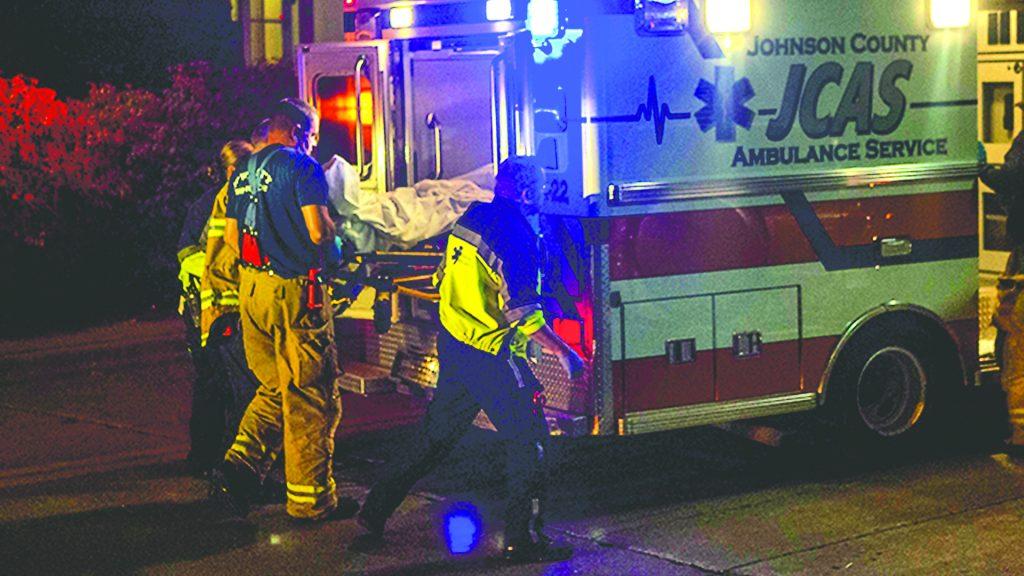UISG-backed medical-amnesty bill advances in Iowa Legislature
Bills to protect underage drinkers in medical emergencies gets closer to law after committee and subcommittee passage.
An ambulance takes away a intoxicated drinker at east Washington St. on Friday, Oct. 9, 2015. (File Photo/The Daily Iowan)
February 28, 2019
Students and state legislators are moving to protect people experiencing an alcohol-related medical emergency from prosecution with bills in both chambers of the state Legislature.
Such legislation would grant individuals requesting emergency services and victims in need of the services in situations such as underage alcohol consumption, public intoxication, and open container, amnesty from criminal prosecution. It generally stipulates both parties cooperate with law enforcement and emergency personnel.
House Study Bill 175, proposed by House Public Safety committee Chair Rep. Jarad Klein, R-Keota, and Senate File 342, proposed by the Senate Judiciary Committee, are companion bills that would create limited immunity from certain alcohol-related criminal offenses. Klein was unavailable for comment by the time of publication.
The House bill was passed by a three-person public safety subcommittee on Monday, and the Senate Judiciary Committee passed its bill Feb. 21 with one senator absent. The Senate file is eligible for debate on the floor.
Student governments at the three state Board of Regents universities — the University of Iowa, Iowa State University, and the University of Northern Iowa — have all pushed for medical amnesty in the Legislature since at least the 2016-17 academic year.
UI Student Government Governmental-Relations Director Connor Wooff said he is pleased to see that the bills this year are moving through the Legislature faster than expected, noting that bipartisan support has helped.
“We have two majority party legislators that are committee chairs running the bills,” Wooff said. “It helps us feel a little bit better about the progress and the future of the bills.”
The state Senate passed last year’s medical-amnesty legislation, but the bill was not put to a vote in the House.
RELATED: Medical amnesty continues to advance in Iowa Legislature
UISG Sen. Jocelyn Roof, the Governmental Relations Committee chair, said UISG has worked with lawmakers and student governments at ISU and UNI in previous years. Organization members have written drafts of bills that legislators have eventually sponsored, she said.
“A lot of members of our organization have really tried to get some fire under it and get it moving in both chambers,” Roof said.
She said she believes medical-amnesty laws would help student safety by eliminating any fear of legal repercussions for students seeking help for themselves or others.
Regent spokesman Josh Lehman said the regents support the student governments at Iowa universities.
“This is something that has been backed by students at our public universities in the past and we continue to support their efforts,” Lehman said in an email to The Daily Iowan.
Both bills would also direct the regent universities to not impose sanctions such as removal from a course, enrollment restrictions, suspension or expulsion from the university, or eviction or exclusion from university housing if the student is protected under the new section the bill adds.
RELATED: Hawkeyes meet with state legislators to advocate for medical amnesty, minimizing budget cuts
The UI’s Responsible Action Protocol protects students in, most cases, from being subject to status sanctions such as disciplinary probation or suspension under the Code of Student Life when seeking emergency assistance for themselves or another student experiencing an alcohol or drug-related emergency. However, the protocol only applies to the UI Code of Student Life and the University Housing and Dining Guidebook, and does not apply to legal actions from law enforcement.
Iowa City police Sgt. Derek Frank, the public-information officer, said he does not want students to let fear of possible citations get in the way of making a call for emergency services, which could jeopardize the health of themselves or others.
He said officers generally do not give out citations in that situation.
“We see the priority here,” Frank said. “We’ve all been college students and that age in the past. We understand what it’s like to grow up and make decisions like that — we’re humans, too.”
Wooff said even though police officers may give out citations on a case-by-case basis, students facing a medical emergency may still fear repercussions.
“In that process, they’re afraid of getting in trouble when they have a medical emergency, whether it’s a friend or a stranger,” Wooff said. “We think it’s something that Iowa should have at this point.”






